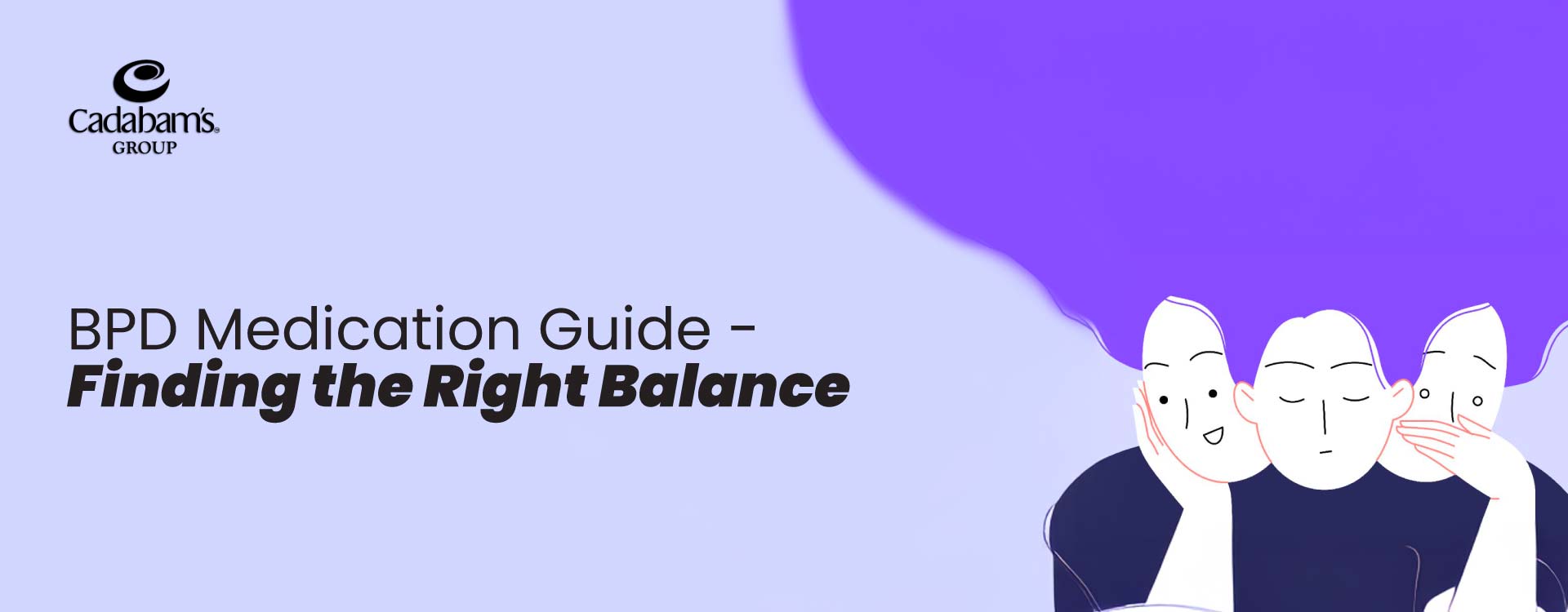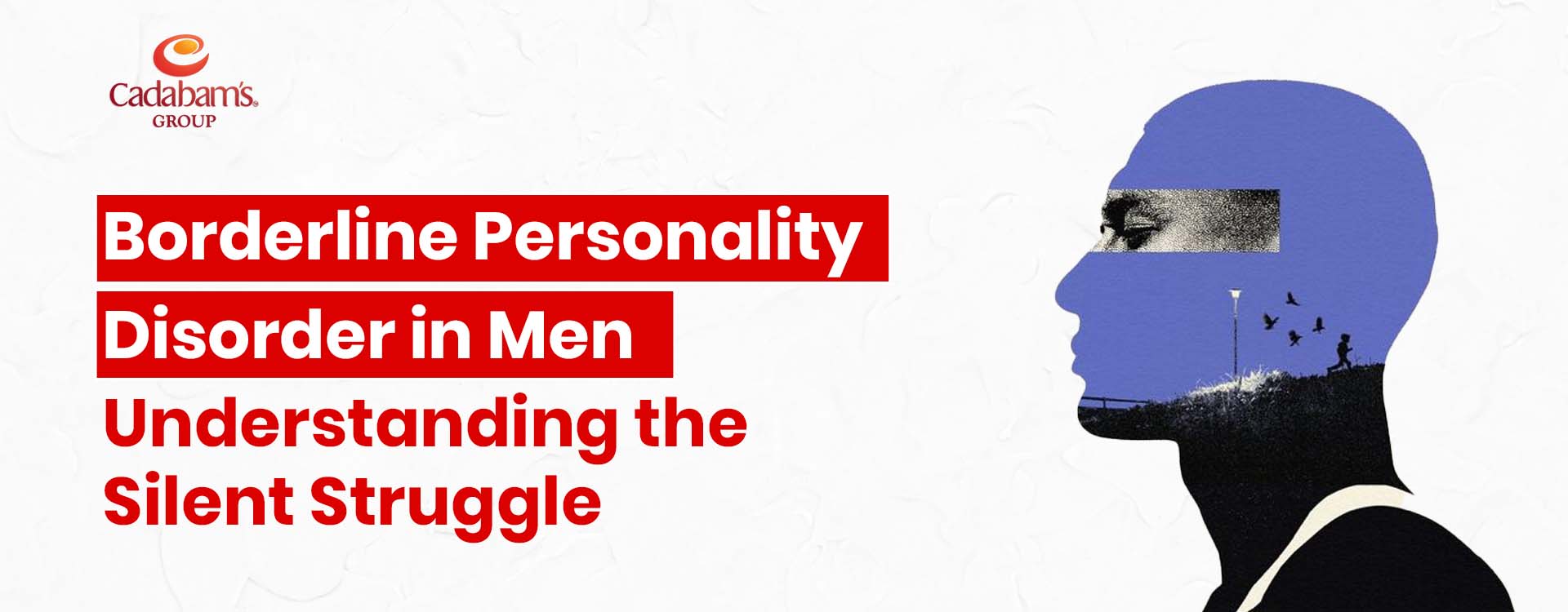Avoidant personality disorder involves intense fear of rejection and social withdrawal. With early diagnosis and expert care, including rehab at Cadabam’s, it can be effectively managed and treated.
What is Avoidant Personality Disorder?
Avoidant Personality Disorder is a mental health condition marked by chronic social inhibition, fear of rejection, and feelings of inadequacy.
It differs from shyness or social anxiety by being more persistent and impairing. According to the DSM-5, it involves deep avoidance of relationships due to fear of negative evaluation. This makes understanding what is avoidant personality disorder is essential for early intervention and long-term support.
Signs and Symptoms of Avoidant Personality Disorder
People with avoidant personality disorder (AVPD) often begin experiencing symptoms in adolescence or early adulthood. These symptoms are persistent and impact their ability to form and maintain social or professional connections.
Emotional and Cognitive Symptoms
People with avoidant personality disorder often experience:
- Chronic self-criticism and negative self-evaluation
- Intense fear of rejection or ridicule
- Deep-seated feelings of inferiority
- Over analysis of social interactions and perceived mistakes
- Heightened sensitivity to feedback, even when it is neutral or constructive
These emotional symptoms are often rooted in early avoidant personality disorder causes such as childhood rejection or emotional neglect.
Behavioural Signs
Behavioural indicators of AVPD may include:
- Avoiding school, work, or social activities to escape judgment
- Withdrawing from group settings or conversations
- Excessive reluctance to try new things for fear of failure
- Skipping opportunities for personal or professional growth
- Developing routines that minimise interaction with others
Behavioural patterns like these often respond well to structured avoidant personality disorder treatment involving therapy and lifestyle changes.
Relationship Difficulties
Avoidant personality disorder and intimacy often clash. While individuals with AVPD crave meaningful connection, their fear of vulnerability leads to emotional distance and relational conflict. Common challenges include:
- Difficulty initiating or maintaining romantic and platonic relationships
- Reluctance to express affection or trust others
- Constant worry about being judged or rejected by partners
- Misinterpreting neutral behaviours as criticism or disinterest
- Engaging in “push-pull” dynamics, seeking closeness, then withdrawing
With guided avoidant personality disorder psychotherapy, many individuals can work through these relational challenges and build healthier emotional connections.
Exploring the Causes and Risk Factors of AVPD
The aetiology of avoidant personality disorder includes genetic, psychological, and environmental factors. Trauma, critical parenting, and social anxiety traits contribute. Identifying these early can improve outcomes through targeted avoidant personality disorder treatment and psychotherapy.
Causes of Avoidant Personality Disorder
Common avoidant personality disorder causes include childhood neglect, emotionally critical parenting, and genetic predisposition. These experiences reinforce negative beliefs about self-worth, contributing to the aetiology of avoidant personality disorder and shaping long-term behavioural patterns.
Risk Factors and Vulnerable Populations
Risk factors include early social anxiety, extreme introversion, and a family history of mental illness. Children exposed to rejection, ridicule, or low emotional support are more vulnerable to developing AVPD. Recognising these factors can help in early avoidant personality disorder diagnosis and timely intervention.
How is Avoidant Personality Disorder Diagnosed?
Diagnosing avoidant personality disorder requires a comprehensive clinical evaluation. It involves assessing long-standing patterns of avoidance, low self-worth, and social inhibition. Due to symptom overlap with other Cluster C conditions, expert interpretation is essential for an accurate avoidant personality disorder diagnosis.
To understand how it differs from other conditions, here’s a structured comparison:
Cluster Classification
- Avoidant Personality Disorder is classified under Cluster C (anxious and fearful personality disorders).
- Social Anxiety Disorder is not a personality disorder but falls under anxiety disorders.
- Schizoid Personality Disorder belongs to Cluster A personality disorders, marked by odd and eccentric behaviour.
Ego Alignment
- Avoidant personality disorder is ego-syntonic—behaviours feel like a natural part of the self.
- Social Anxiety Disorder is ego-dystonic—symptoms are distressing and unwanted.
- Schizoid Personality Disorder is ego-syntonic, but the individual remains emotionally detached.
Insight into the Condition
- Individuals with avoidant personality disorder often have limited insight and avoid seeking help.
- Those with Social Anxiety Disorder usually have intact insight and may actively seek treatment.
- People with Schizoid PD show minimal insight or interest in their emotional detachment.
Desire for Relationships
- Those with avoidant personality disorder deeply desire connection but are inhibited by fear.
- Individuals with Social Anxiety Disorder want social approval but fear negative evaluation.
- People with Schizoid PD typically lack interest in forming close relationships.
Core Fear
- In avoidant personality disorder, the core fear is rejection, criticism, or humiliation.
- In Social Anxiety Disorder, it’s embarrassment during specific interactions or performances.
- In Schizoid PD, the fear relates to intimacy or emotional dependency.
Behavioural Focus
- Avoidant personality disorder shows chronic avoidance across various life contexts.
- Social Anxiety is marked by situational avoidance (e.g. public speaking or parties).
- Schizoid PD is characterised by indifference to social interaction and norms.
Symptom Scope
- Avoidant personality disorder is pervasive and impacts personality over the long term.
- Social Anxiety symptoms are context-specific and emotionally reactive.
- Schizoid PD shows flat affect and limited emotional expression.
Diagnostic Criteria Reference
- Avoidant personality disorder diagnosis is made when DSM-5 criteria for avoidant PD are met.
- Social Anxiety Disorder is diagnosed under the DSM-5 anxiety disorder category.
- Schizoid PD diagnosis follows the DSM-5 criteria for schizoid personality disorder.
Diagnostic Criteria (as per DSM-5)
According to the DSM-5, avoidant personality disorder is diagnosed when at least four of the following are present: social inhibition, feelings of inadequacy, hypersensitivity to criticism, avoidance of interpersonal contact, fear of rejection, low self-esteem, and reluctance to engage in new activities due to embarrassment. These criteria form the core of avoidant personality disorder diagnosis and help differentiate it from overlapping conditions.
Diagnostic Assessments and Tests
Avoidant personality disorder diagnosis involves structured tools like SCID-II, personality inventories, and detailed therapist interviews.
These assessments explore long-term behaviour patterns, emotional responses, and social functioning to differentiate AVPD from other mental health conditions. Early and accurate avoidant personality disorder diagnosis supports tailored intervention, especially when considering long-term avoidant personality disorder treatment.
Differential Diagnosis
Avoidant personality disorder must be distinguished from social anxiety disorder, schizoid personality disorder, and generalised anxiety.
Unlike schizoid PD, individuals with AVPD desire relationships. Unlike social phobia, AVPD reflects enduring personality traits rather than context-specific anxiety. These distinctions reinforce the need for expert-led avoidant personality disorder diagnosis.
Complications in Diagnosis
Avoidant personality disorder often goes undetected due to overlapping symptoms with social anxiety disorder and depression. Individuals may underreport distress because of shame or fear of judgement.
AVPD may also be masked by comorbid conditions like GAD or other Cluster C disorders, making accurate diagnosis challenging. Clinical expertise is crucial to avoid misdiagnosis and delayed treatment.
Why Accurate Diagnosis Matters?
Misdiagnosing avoidant personality disorder can lead to ineffective treatment, such as short-term anxiety care instead of long-term avoidant personality disorder psychotherapy.
Accurate diagnosis ensures appropriate intervention, sets realistic recovery goals, improves engagement, and identifies when specialised rehab, like at Cadabam’s, may be needed.
Effective Treatment Approaches for Avoidant Personality Disorder
Avoidant personality disorder treatment focuses on long-term psychotherapy, including CBT and psychodynamic therapy.
Desensitisation techniques, group therapy, and medication support may also be used to reduce symptoms and improve social functioning.
Cognitive Behavioural Therapy (CBT)
Avoidant personality disorder cognitive behavioural therapy focuses on identifying and challenging negative thoughts.
CBT is one of the most effective forms of avoidant personality disorder psychotherapy. It uses techniques like cognitive restructuring and graded exposure to reduce avoidance, build confidence, and improve social and emotional coping.
Desensitization Therapy
Avoidant personality disorder desensitisation therapy involves gradual, controlled exposure to feared situations.
It helps reduce anxiety, improve tolerance, and break avoidance cycles, especially when combined with CBT in structured therapy settings.
Psychodynamic Psychotherapy
Psychodynamic psychotherapy explores unconscious conflicts, early relational patterns, and emotional defences.
For avoidant personality disorder, it helps individuals understand the roots of avoidance and build healthier interpersonal dynamics through long-term therapeutic relationships.
Schema Therapy
Schema therapy targets deeply ingrained negative beliefs developed in childhood. It helps individuals with avoidant personality disorder challenge core schemas like defectiveness or rejection, promoting healthier behaviours in both rehab and outpatient settings.
Group Therapy
Group therapy offers a safe space for individuals with avoidant personality disorder to practise social skills, reduce isolation, and receive peer feedback. It fosters connection, emotional expression, and gradual exposure to interpersonal interactions.
Medication Support
Medication support for avoidant personality disorder may include SSRIs or anti-anxiety drugs to manage comorbid depression or generalised anxiety. While not a standalone treatment, it complements avoidant personality disorder treatment and improves emotional regulation.
Navigating Relationships with Avoidant Personality Disorder
Avoidant personality disorder relationships are shaped by fear of rejection and intimacy issues. Individuals may crave closeness but withdraw emotionally. Dating someone with avoidant personality disorder requires empathy, patience, and respect for boundaries. Therapy helps build trust, communication, and emotional resilience.
Cadabam’s: Pioneering Support and Advanced Treatments for Avoidant Personality Disorder
At Cadabam’s, we offer comprehensive care with innovative treatment options for patients battling Avoidant Personality Disorder. Our experienced and compassionate team of professionals provides proven techniques, such as Cognitive Behavioural Therapy and psychodynamic therapy, to help clients overcome social anxiety, rebuild self-esteem, and improve social interaction, along with personalised support to alleviate the symptoms.
If you are searching for a solution to your problem, Cadabam’s Rehabilitation Centre can help you with its team of specialized experts. We have been helping thousands of people live healthier and happier lives for 30+ years. We leverage evidence-based approaches and holistic treatment methods to help individuals effectively manage their Avoidant Personality Disorder. Get in touch with us today. You can call us at +91 96111 94949.
FAQ
How is Avoidant Personality Disorder officially diagnosed?
Avoidant personality disorder diagnosis involves clinical interviews, DSM-5 criteria, and psychological assessments like SCID-II. A mental health professional evaluates persistent avoidance behaviours, fear of rejection, and low self-esteem to distinguish AVPD from overlapping conditions. An accurate avoidant personality disorder diagnosis is essential for effective treatment planning.
What are the primary causes of Avoidant Personality Disorder?
Primary avoidant personality disorder causes include childhood neglect, critical parenting, and genetic predisposition. These early experiences shape feelings of unworthiness, social anxiety, and fear of rejection that lead to long-term personality patterns and reinforce the need for early avoidant personality disorder treatment.
Can Avoidant Personality Disorder be cured?
What is avoidant personality disorder often leads to the question of whether it can be cured. While AVPD cannot be fully “cured” in the traditional sense, but can be effectively managed. Long-term avoidant personality disorder psychotherapy, lifestyle changes, and support systems help reduce avoidance behaviours and improve emotional and social functioning over time.
What role does psychotherapy play in treating APD?
Psychotherapy is the foundation of avoidant personality disorder treatment. CBT, schema therapy, and psychodynamic approaches help individuals build confidence, challenge negative beliefs, and develop healthier relationships through emotional and behavioural change. Specialised avoidant personality disorder psychotherapy can address deep-rooted fears and improve social skills.
How does APD affect relationships and intimacy?
AVPD often causes intimacy issues, with individuals fearing rejection yet craving connection. They may withdraw emotionally, misinterpret feedback, and struggle with trust. Therapy helps improve communication, emotional safety, and relationship stability.
.webp)







